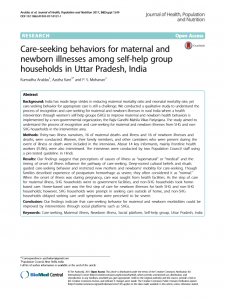
India has made large strides in reducing maternal mortality ratio and neonatal mortality rate, yet care-seeking behavior for appropriate care is still a challenge. We conducted a qualitative study to understand the process of recognition and care-seeking for maternal and newborn illnesses in rural India where a health intervention through women’s self-help groups (SHG) to improve maternal and newborn health behaviors is implemented by a non-governmental organization, the Rajiv Gandhi Mahila Vikas Pariyojana. The study aimed to understand the process of recognition and care-seeking for maternal and newborn illnesses from SHG and non-SHG households in the intervention area.
Thirty-two illness narratives, 16 of maternal deaths and illness and 16 of newborn illnesses and deaths, were conducted. Women, their family members, and other caretakers who were present during the event of illness or death were included in the interviews. About 14 key informants, mainly frontline health workers (FLWs), were also interviewed. The interviews were conducted by two Population Council staff using a pre-tested guideline in Hindi.
Our findings indicate that care-seeking behavior for maternal and newborn morbidities could be improved by interventions through social platforms such as SHGs.